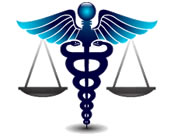

Medical Malpractice Connections

Instructions for an “Expert Witness” testifying at trial
- Be well prepared with the facts of the case.
- Create a “Choronology” of medical records.
- Review the relevant medical literature.
- Look at the lawyer who is questioning you, or at the jury.
- Dress /conduct.
- Wear a conservative suite to trial and leave any fancy jewelry at home.
- Avoid any “nervous habits” (nervous laughing, smiling at inappropriate times).
- Respect the seriousness of what you are doing.
- Opinion must be held to a reasonable degree of medical probability.
- If you are testifying on the “Standard of Care”, you must keep in mind the following things:
- The “Standard of Care” means degree of skill and diligence that a reasonably prudent physician in the defendant’s specialty would have used under the same circumstances of the case.
- A doctor breached the “Standard of Care” if he/she does something that a reasonably prudent doctor would not do, or fails to do something that a reasonably prudent doctor would do.
- A physician is negligent only if he/she breached the “Standard of Care”
- An expert must be familiar with the “Standard of Care” for the relevant area.
- Opinion must be based on facts in the record and reasonable medical probabilities, not guesswork or speculation.
- Be prepared for questions about your charges as an expert and take no offense. In addition you may be asked about percentages of your work for the plaintiff vs the defendant.
- Be familiar with what you have said in your deposition and be familiar with the expert witness designation as to what you are expected to testify at trial.
- You may bring notes with you to the witness stand as to the facts that you believe are the most pertinent.
- Medical literature.
- Medical literature supporting your opinions can assist a jury in deciding whom they should believe.
- If you admit that an article is a reliable authority you may be cross examined on anything written in the article.
- You may also be cross examined on anything that you have published.
- Speak so the jury can understand.
- If you use technical language, explain it in lay terms to the jury.
- Be a teacher.
- The expert who best teaches the jury is the expert the jury believes.
- Avoid being the expert.
- Build up your “expert” credentials through your education, experience, and publications, but do not fall into the trap of saying “I am the expert”.
- Do not be a “yes man”, but do not get angry at or try to out-lawyer the opposing attorney.
- You are not an advocate for either side of the case, but you are an advocate for your opinions.
- You are free to vigorously defend your opinions, but do not express anger or disdain toward the opposing attorney.
- If you cannot legitimately answer with a simple yes or no then you can answer such as “I can’t answer without explaining”, and then proceed to answer the question as best you can.
- If an attorney is sarcastic with you, do not return the sarcasm. Be polite, respectful, and firm. The meaner the attorney gets, the nicer you get.
- Admit conferences with the attorney with whom you are working.
- Objections.
- If there is an objection made by any lawyer, be certain to allow the judge to rule on the objection before you answer.
- If the judge sustains an objection, then you cannot answer.
- If the judge overrules an objection, then you can answer.
- Teaching aides.
- Have available at the trial medical exhibits which will include the medical records that you have reviewed.
- Have medical illustrations and/or animations to assist you in explaining things to the jury.
- Listen carefully to the question.
- Attorneys may mischaracterize your prior testimony, pretend to be confused by something you say, or even to misstate facts from the medical records.
- If you do not understand the question, feel free to ask the attorney to repeat it.
- If the attorney is mischaracterizing what you said, you can correct him.
- Questions outside your area of expertise.
- If questions are outside your area of expertise, do not be afraid to say that.
- If you’re asked to express an opinion on some issue for which you are not designated, you can feel free to say “I did not formulate an opinion on the issue”.
- Referring to the medical records.
- Do not be reluctant to refer to the medical records in order to obtain the facts that you need.
- Do not speculate or guess as to the facts.
- Cross-Examination.
- Sometimes your best opportunity to explain your opinion is on cross-examination. Take advantage of it.
- Commenting on other side’s expert testimony.
- Sometimes the other side’s expert is disingenuous or, frankly, lying. Counsel may try to bait you into saying that the other expert is a liar. Do not take the bait. You can respond by saying that you strongly disagree with the other side’s expert.
| Top of page |
| Home | Medical Malpractice Attorneys | Medical Experts | Medical Negligence | Services | Statute of Limitations | About Us | Contact Us |